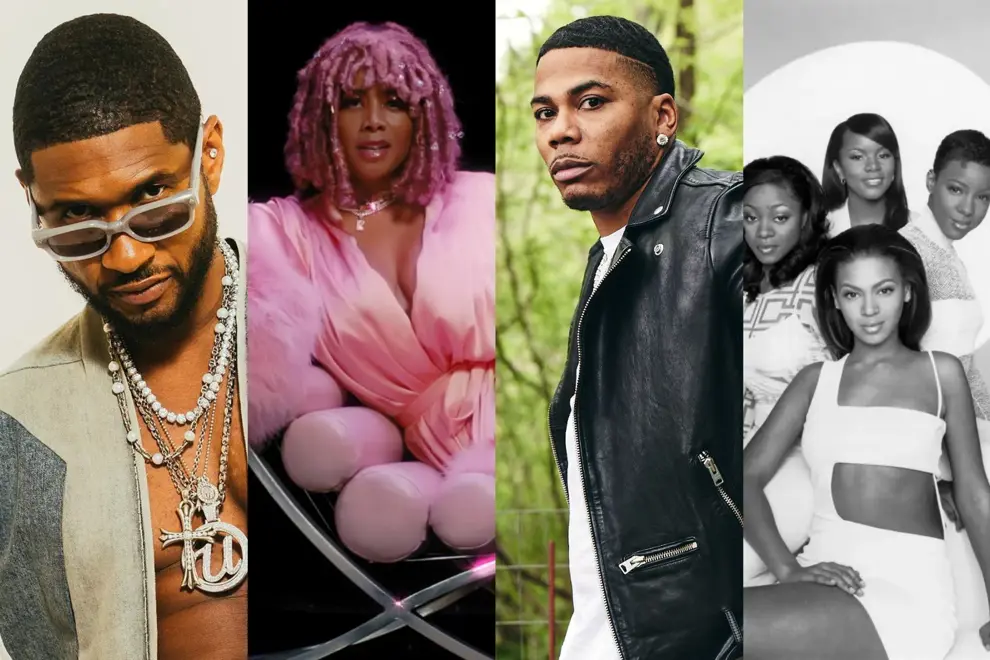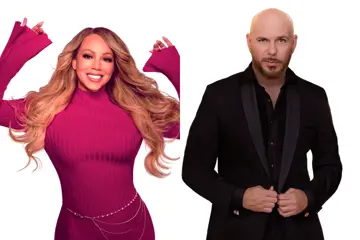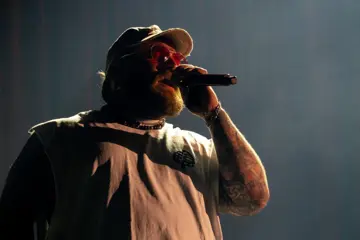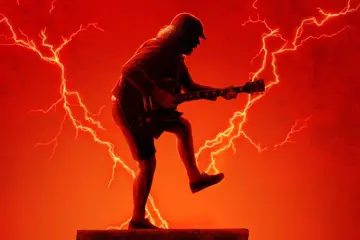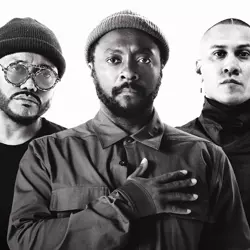 Black Eyed Peas
Black Eyed PeasIn the late ’90s and early 2000s, you couldn’t move without bumping into a boy band, girl group or teenaged blonde bombshell, but by 2004, two things had happened.
Firstly, that kind of manufactured pop had morphed into reality TV-spawned pop, with Australian Idol in full swing and no less than nine ARIA #1 singles from Idol contestants in 2004.
Secondly, R&B and hip-hop had become the dominant genres on the ARIA singles chart, with around half of 2004’s year-end Top 50 comprised of tracks from those genres, predominantly by US artists. These were some of the biggest “urban” (as the genres were collectively known at the time) hits from 20 years ago...
Yeah! (featuring Lil Jon and Ludacris), Burn and Confessions Part II by Usher
Remember crunk? That shortlived hip-hop subgenre, championed by Lil Jon, arguably peaked with Usher’s global chart-topper Yeah!, paving the way for R&B artists to go full EDM in the years to follow.
Proving he hadn’t entirely abandoned his soulful roots, Usher scored two more ARIA Top Five hits in 2004 with ballads Burn and Confessions Part II. All three songs were taken from his fourth studio album, Confessions, which – as its title suggested – saw the singer deliver his most personal collection up until that point.
Shut Up, Hey Mama and Let’s Get It Started by The Black Eyed Peas
Having finally broken through to the mainstream in 2003 with the Justin Timberlake-featuring Where Is The Love?, The Black Eyed Peas dominated 2004 with hits from third album Elephunk. Released in late 2003, Shut Up became the first #1 single of 2004, and was followed in quick succession by Hey Mama and Let’s Get It Started (which had started out on the album as Let’s Get Retarded before a more politically correct redux was minted for radio). The Elephunk singles were the first four in a run of 15 Top Ten hits in Australia, ending in 2011’s Just Can’t Get Enough.
F**k It (I Don’t Want You Back) by Eamon and F.U.R.B. (F U Right Back) by Frankee
If you ever needed proof that a well-timed F-bomb is sometimes all it takes to land an international mega-hit, consider this pair of singles that took off in 2004 (although Eamon’s track dated back to late 2003). Then-20-year-old New York singer Eamon found himself topping charts with his caustic debut single, F**k It (I Don’t Want You Back), which told a cheating ex, in no uncertain terms, where to go.
It became such a phenomenon that it inspired the response track F.U.R.B. (F U Right Back), allegedly performed by the ex in question, but ultimately nothing more than marketing spin with Frankee making the most of the opportunity to cash in. Both singles reached #1 in Australia, and both artists were never heard of beyond 2004 – though Eamon did sneak in another Top 30 hit, I Love Them H*’s, before the year’s end. All class.
One Call Away by Chingy featuring J-Weav
Signed to Ludacris’ Disturbing Tha Peace label, St. Louis rapper Chingy (known to his family as the decidedly less street Howard Earl Bailey Jr.) already had one ARIA Top Ten hit under his belt, in the form of debut single Right Thurr. But it was 2004’s One Call Away that gave him his highest placing, reaching #5. The song featured actor Jason Weaver on chorus vocals, and another former child star, The Cosby Show’s Keisha Knight Pulliam, in the music video.
Tipsy by J-Kwon
Fellow St. Louis rapper J-Kwon turned 18 in 2004, which posed no problems for the Australian success of his debut single, Tipsy. But he was still three years shy of the legal drinking age in the US – although getting tipsy in the club was just the tip of the iceberg when it came to the lyrics of this party-starting hip-hop jam. A one-hit wonder locally, J-Kwon hasn’t released any new music in almost a decade.
My Band by D12 featuring Cameo
It can not be overstated just how massive Eminem was in the early 2000s, appealing to everyone from triple j listeners to Smash Hits readers. The flow-on effect of Slim Shady’s success was that his group, D12, also made a decent showing on the ARIA Charts – including with this #1 hit from 2004 that sent up the idea of Eminem as their leader. The fact that D12 reached the Top Five on two other occasions suggests that while Eminem’s involvement might have turned people on to the group, they stuck around for the ride.
My Place, Flap Your Wings and Tilt Ya Head Back (featuring Christina Aguilera) by Nelly
In the pre-streaming age, double albums were a risky proposition – but Nelly’s run of hits prior to 2004 (Hot In Herre, Ride Wit Me, Dilemma) had positioned him as one of hip-hop’s biggest stars. So why not release two albums at once: the more laidback Suit, which included slow jam My Place, and the dancefloor-friendly Sweat, from which Flap Your Wings was lifted.
Issued as a double A-side, those two tracks topped the ARIA Charts, while Christina Aguilera collab Tilt Ya Head Back (also from Sweat) kept the hits coming. The albums themselves, on the other hand, didn’t fare as well as Nelly’s previous efforts, and the highlights were packaged together in 2005 as Sweatsuit.
Lose My Breath by Destiny’s Child
The start of the Destiny’s Child’s last gasp (before they disbanded in 2005), tough R&B track Lose My Breath, signalled a new direction for the trio, who had all enjoyed solo success since their previous album together, Survivor. An edgier, more mature song, Lose My Breath was accompanied by a memorable music video in which alternate versions of Beyoncé, Kelly Rowland and Michelle Williams competed in a dance-off.
Milkshake and Trick Me by Kelis
Released in Australia in January 2004, career-defining track Milkshake not only spawned a catchphrase but boosted Kelis Rogers into the A-list. And while the Neptunes-produced track that brought fans to her yard could have been hard to live up to, Kelis proved her staying power with follow-ups Trick Me (produced by Dallas Austin) and Millionaire (produced by and featuring André 3000), as well as a guest spot on Not In Love by Enrique Iglesias keeping her in the Top 50 for the majority of the year.
I Don’t Wanna Know by Mario Winans featuring Enya and P. Diddy
2004's only R&B hit to feature the Celtic phenomenon, due to the sampling of Enya’s 1987 tune Boadicea, I Don’t Wanna Know was also the only single released by singer-songwriter Mario Winans to crack the ARIA Top 100. Signed to Bad Boy Records – hence the appearance by label boss P. Diddy on the moody track – Winans was previously signed to Motown Records and launched without success in 1997. His second time trying was the charm – briefly – with I Don’t Wanna Know reaching #2 in Australia and the US, and topping the UK chart.

